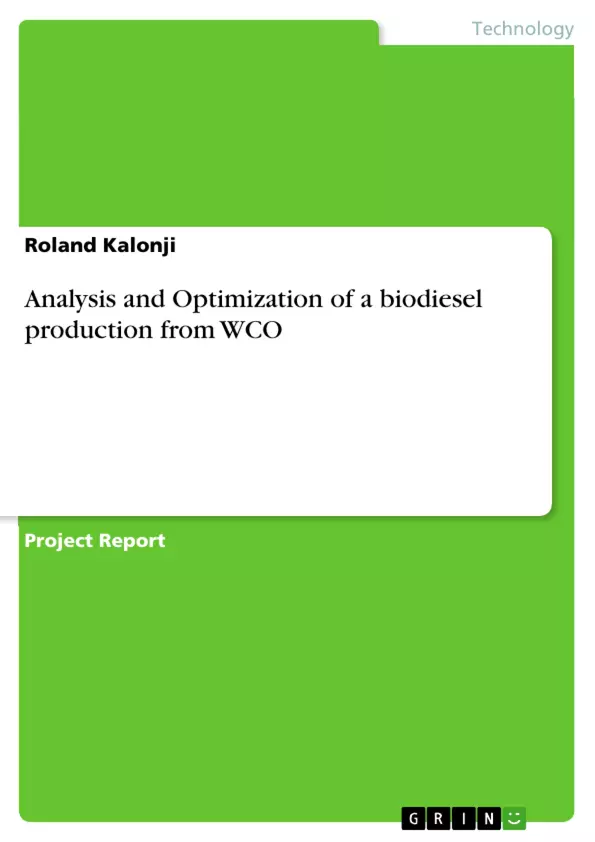The conventional approach of biodiesel production is transesterification, using oil and alcohol in the presence of a catalyst with glycerol as a by-product of the reaction. Product quality is dependent on the type and amount of catalyst, type of oil feedstock, alcohol-to-oil ratio, etc. In terms of the best process, currently the alkali catalyzed process is the most profitable while the enzymatic based one is even more promising due to the lower consumption of energy and water; however it requires that the enzyme cost is reduced.
The reason that biodiesel is not utilized widely around the world is due to the high cost of raw materials. To overcome this, one can use lower quality oils, such as Waste Cooking Oil (WCO). A lot of research has been carried out on the production of biodiesel from fresh vegetable and animal oil sources but the use of Waste Cooking Oil, such as palm oil, etc. has not been well documented. Then the aim of this current project is to analyze and optimize the conditions for biodiesel production from Waste Cooking Oil, by investigating interaction effects among process variables (temperature, oil-to-methanol molar ratio and catalyst loading) using SPC and other tools. Thus this project focuses on making biodiesel processes better and more efficient.
Inhaltsverzeichnis (Table of Contents)
- Acknowledgements
- Table of Contents
- List of figures
- List of Tables
- Abstract
- 1. Introduction
- 1.1 Current State Analysis
- 1.2 Literature Review
- 1.2.1 Biodiesel
- 1.2.2 Waste Cooking Oil (WCO)
- 1.2.3 Biodiesel Production
- 1.3 Problem statement
- 2. Root Cause Analysis
- A. Ishikawa diagram
- B. SWOT-analysis
- 2.1 Research Question
- 2.2 Objectives
- 2.3 Experimentation
- 3. Statistical Techniques
- 3.1 Observations
- 3.2 Analysis
- 4. Results and Solution
- 5. Discussions
- 6. Conclusion
- 7. References
- Appendices
- Appendix A: Health and Safety aspects
- Appendix B: Transportation of biodiesel
- Appendix C: Ishikawa diagram
- Appendix D: SWOT-Analysis
Zielsetzung und Themenschwerpunkte (Objectives and Key Themes)
This project report analyzes the production of biodiesel from waste cooking oil (WCO) and aims to optimize the process. It explores the current state of biodiesel production, examines relevant literature on biodiesel, WCO, and biodiesel production techniques, and identifies key challenges and opportunities in the process.
- Biodiesel production from waste cooking oil (WCO)
- Optimization of the biodiesel production process
- Root cause analysis of challenges in WCO utilization
- Statistical techniques for data analysis and process improvement
- Sustainable and environmentally friendly solutions for biodiesel production
Zusammenfassung der Kapitel (Chapter Summaries)
The report begins with an introduction outlining the current state of biodiesel production, providing a literature review on biodiesel, WCO, and production processes, and defining the problem statement. Chapter 2 focuses on root cause analysis using Ishikawa diagrams and SWOT-analysis to identify key issues and challenges related to WCO utilization. The chapter also presents the research question and objectives, as well as the experimental methods employed. Chapter 3 discusses the statistical techniques used for data analysis and observation, laying the groundwork for understanding the results and solutions presented in Chapter 4.
Schlüsselwörter (Keywords)
The key terms and concepts explored in this report include biodiesel production, waste cooking oil (WCO), transesterification, root cause analysis, SWOT analysis, statistical techniques, process optimization, sustainability, and environmental impact. These themes provide a comprehensive overview of the research focus and the primary concerns addressed in the study.
Frequently Asked Questions
What is the main goal of this project on biodiesel?
The project aims to analyze and optimize the production of biodiesel from Waste Cooking Oil (WCO) to make the process more efficient and cost-effective.
Why is Waste Cooking Oil (WCO) used as a feedstock?
Using WCO reduces the cost of raw materials, which is the main barrier to widespread biodiesel utilization, while also providing an environmentally friendly disposal solution.
Which process variables are investigated for optimization?
The study investigates the interaction effects of temperature, oil-to-methanol molar ratio, and catalyst loading on the quality and yield of biodiesel.
What is transesterification?
Transesterification is the conventional chemical reaction used to produce biodiesel by reacting oil with an alcohol (like methanol) in the presence of a catalyst.
Which analytical tools are used in this study?
The project utilizes Root Cause Analysis (Ishikawa diagrams), SWOT-analysis, and Statistical Process Control (SPC) tools to evaluate and improve the process.
- Quote paper
- Roland Kalonji (Author), 2017, Analysis and Optimization of a biodiesel production from WCO, Munich, GRIN Verlag, https://www.grin.com/document/387455



